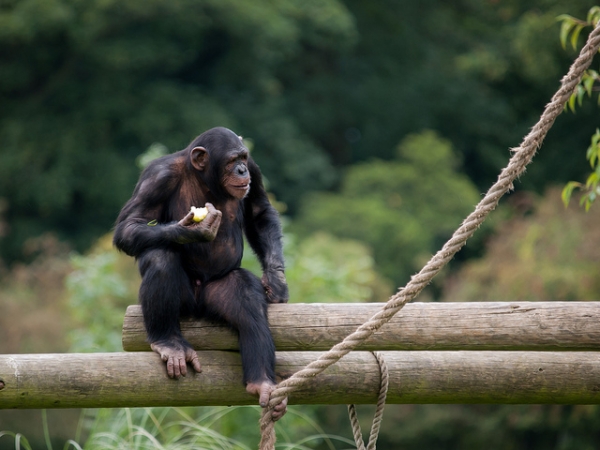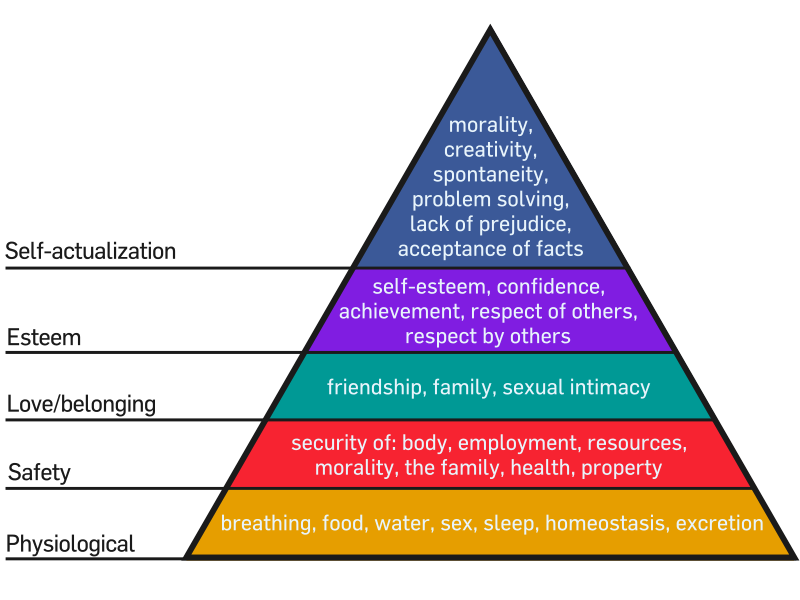It looks like you're using an Ad Blocker.
Please white-list or disable AboveTopSecret.com in your ad-blocking tool.
Thank you.
Some features of ATS will be disabled while you continue to use an ad-blocker.
3
share:

University Herald
Similar to humans, chimpanzees are sensitive to social influences, but unlike many humans, they manage to maintain their own strategy to solve a problem rather than conform to what the majority of group members are doing.
MPI Researchers found that chimpanzees are hesitant to abandon their personal preferences and behavior, even when that "familiar behavior" becomes ineffective, according to a press release. However they do change their behavior when they can obtain greater rewards.
How do humans respond?
Wikipedia: Peer Pressure
The Asch conformity experiments were a series of laboratory studies published in the 1950s that demonstrated a surprising degree of conformity to a majority opinion. These are also known as the Asch Paradigm. Experiments led by Solomon Asch of Swarthmore College asked groups of students to participate in a "sight test." In reality, all but one of the participants were confederates of the experimenter, and the study was really about how the remaining student would react to the confederates' behavior.
Wikipedia: Asch Conformity Experiments

Each participant was placed in a room with seven "confederates". Confederates knew the true aim of the experiment, but were introduced as participants to the "real" participant. Participants were shown a card with a line on it, followed by a card with three lines on it (lines labeled A, B and C, respectively). Participants were then asked to say aloud, which line (i.e., A, B or C) matched the line on the first card in length. Each line question was called a "trial". Prior to the experiment, all confederates were given specific instructions on how they should respond to each trial. Specifically, they were told to unanimously give the correct response or unanimously give the incorrect response. The group sat in a manner so that the real participant was always the last to respond (i.e., the real participant sat towards the end of a table). For the first two trials, the participant would feel at ease in the experiment, as he and the confederates gave the obvious, correct answer. On the third trial, the confederates would all give the same wrong answer, placing the participant in a dilemma.
So in Chimpanzee society, a Chimp will still observe the actions of his or her friends, and then change what he or she does if it proves to reap a better reward - but if it does not, the chimp will not change his or her methodology.
If a Chimpanzee was involved in the Asch Conformity Experiment, he or she would likely ignore the wrong answers given by peers and give the correct one.
Notice that the Chimps will not abandon familiar behavior, even if it is proven ineffective, until they are shown behavior that is effective.
Humans, on the other hand, are an entirely different social animal - I get the feeling that they don't even worry about what is effective or not most of the time - and this is the dangerous part of the human race.
An example involving the clause two paragraphs above: let us say that people decide that drinking water does not work because their water has been polluted - someone comes along offering acid as a solution - people might flock to the acid before it has proven to be an effective alternative.
-----
However, humans are not the only ones that submit to peer pressure - rats do as well.
Science Blog

Until now, only humans and chimps were known to succumb to peer pressure, to the extent that we often ignore our own experiences based on the preferences of others. But a new study in brown rats shows that these rodents are similarly prone to following the Joneses. They can even be persuaded to choose a piece of food that they know makes them sick if they smell it on the breath of a ‘demonstrator’ rat.
The important part I highlighted in pink because it shows that they will knowingly participate in harmful behavior due to peer pressure.
edit
on 31amTue, 31 Dec 2013 04:16:49 -0600kbamkAmerica/Chicago by darkbake because: (no reason given)
That's very interesting thanks for sharing.
Chimps are programmed differently from us, yet we are meant to have evolved from apes, so where did this need to go along with the crowd regardless of the consequences come from?
I guess it's all part of the hierarchy of needs, a need to belong to a group in order to feel safe. Of course if there was some real reward in the experiment carried out by the scientists, then the results may have differed? Who knows, maybe they should try it again with a monetary reward and this might tell us exactly how different we behave?
Chimps are programmed differently from us, yet we are meant to have evolved from apes, so where did this need to go along with the crowd regardless of the consequences come from?
I guess it's all part of the hierarchy of needs, a need to belong to a group in order to feel safe. Of course if there was some real reward in the experiment carried out by the scientists, then the results may have differed? Who knows, maybe they should try it again with a monetary reward and this might tell us exactly how different we behave?
edit on 31/12/13 by Cobaltic1978 because: Typo
reply to post by Cobaltic1978

This is really interesting. Here is the hierarchy of needs chart. I can actually see some instances of the "Esteem" level interfering with the more important, lower levels - especially if there is political trickery involved.
I could see people giving up their family, resources and property in order to fulfill the "Esteem" category in an unhealthy society.
To go off-topic for a second: technology in general has a way of doing this, as well. People can give up friendship, sexual intimacy, family - even resources, health and employment - even sleep - for the delusion that they will get more back in the future from technology, or maybe simply because they are addicted.
The top tier, however, "Self-Actualization," is an amazing one where there is lack of prejudice, acceptance of facts, spontaneity and creativity -

This is really interesting. Here is the hierarchy of needs chart. I can actually see some instances of the "Esteem" level interfering with the more important, lower levels - especially if there is political trickery involved.
I could see people giving up their family, resources and property in order to fulfill the "Esteem" category in an unhealthy society.
To go off-topic for a second: technology in general has a way of doing this, as well. People can give up friendship, sexual intimacy, family - even resources, health and employment - even sleep - for the delusion that they will get more back in the future from technology, or maybe simply because they are addicted.
The top tier, however, "Self-Actualization," is an amazing one where there is lack of prejudice, acceptance of facts, spontaneity and creativity -
Cobaltic1978
Of course if there was some real reward in the experiment carried out by the scientists, then the results may have differed? Who knows, maybe they should try it again with a monetary reward and this might tell us exactly how different we behave?
That is very interesting - would someone choose a reward like money over unhealthy peer pressure? Wow, that is a complicated idea. You could even get results based on age and gender.
edit on 31amTue, 31 Dec 2013 04:34:01 -0600kbamkAmerica/Chicago by darkbake because: (no reason
given)
reply to post by darkbake
Throughout life we fluctuate between the various tiers depending on our personal circumstances and I know a few people who will forsake the lower tiers in order to achieve the Esteem element. However, how long they stay there or how this effects their mental health state has varied from my observations.
Throughout life we fluctuate between the various tiers depending on our personal circumstances and I know a few people who will forsake the lower tiers in order to achieve the Esteem element. However, how long they stay there or how this effects their mental health state has varied from my observations.
darkbake
Cobaltic1978
Of course if there was some real reward in the experiment carried out by the scientists, then the results may have differed? Who knows, maybe they should try it again with a monetary reward and this might tell us exactly how different we behave?
That is very interesting - would someone choose a reward like money over unhealthy peer pressure? Wow, that is a complicated idea. You could even get results based on age and gender.edit on 31amTue, 31 Dec 2013 04:34:01 -0600kbamkAmerica/Chicago by darkbake because: (no reason given)
I used money as this appears to be top of most people's desires, but you could use whatever motivates people as the carrot. So for example, a new piece of technology could be the reward.
I am assuming that the Chimpanzees used in the experiment were rewarded with food, this would be the motivation for them to ignore what other Chimps are doing. I personally believe that we are programmed to ignore the consensus in order to get the reward we desire, depending on what tier we currently lie in within the hierarchy of needs.
Cobaltic1978
reply to post by darkbake
Throughout life we fluctuate between the various tiers depending on our personal circumstances and I know a few people who will forsake the lower tiers in order to achieve the Esteem element. However, how long they stay there or how this effects their mental health state has varied from my observations.
That is a good way to look at social relationships. I have forsaken lower tiers for the Esteem and even for the Social tier - and when I do this kind of thinking, that is when things turn out badly! Thanks, Cobaltic.
It looks like unhealthy / inverted hierarchy of needs relationships could be signs of unhealthy relationships, peer pressure or politics.
edit
on 31amTue, 31 Dec 2013 05:01:16 -0600kbamkAmerica/Chicago by darkbake because: (no reason given)
Just watch a group of people when someone says something unexpected!
What do we see?
We see them all looking at each other, waiting for clues as to how they should interpret what they just heard.
Maybe I should replace the word "heard" with herd
What do we see?
We see them all looking at each other, waiting for clues as to how they should interpret what they just heard.
Maybe I should replace the word "heard" with herd
Look at how we're programmed from school age on. Today, it's all about self-esteem. Where does that lie on your chart and what does it program you
to look for? I think therein lies your answer. We are being taught to seek approval from the herd before becoming fully self-actualized individuals
which is really the top tier and the most difficult to find and maintain because it means being fully confident in yourself even in the face of
disapproval from others.
Chimpanzees, it seems, may be more self-actualized than we humans are being taught to be.
However, if you made an experiment where the peer pressure result was the one that garnered the chimps more rewards consistently, you could likely raise a society of esteem motivated chimps. It would be interesting to try.
Chimpanzees, it seems, may be more self-actualized than we humans are being taught to be.
However, if you made an experiment where the peer pressure result was the one that garnered the chimps more rewards consistently, you could likely raise a society of esteem motivated chimps. It would be interesting to try.
ketsuko
However, if you made an experiment where the peer pressure result was the one that garnered the chimps more rewards consistently, you could likely raise a society of esteem motivated chimps. It would be interesting to try.
That might be what is happening in the U.S. - that could be how come there is so much media bias and lies in politics, and even religion. I don't think it sounds very healthy. At least between Cobalitc and I we got that Hierarchy of Needs triangle on here.
I think we are being seduced by fake "esteem" in our society that is breaking down the entire rest of the triangle - even parts of its own tier like confidence, respect and achievement - because it is only an illusion of any of them -
Look how hard it is now to even get other things, like security of employment, resources, family, health and property.
Political and religious ideology has started to get in the way of progress in the U.S. recently. I state that as fact.
new topics
-
OK this is sad but very strange stuff
Paranormal Studies: 2 hours ago -
Islam And A Book Of Lies
Religion, Faith, And Theology: 3 hours ago -
Sorry to disappoint you but...
US Political Madness: 6 hours ago -
Watch as a 12 million years old Crab Emerges from a Rock
Ancient & Lost Civilizations: 10 hours ago
top topics
-
Sorry to disappoint you but...
US Political Madness: 6 hours ago, 13 flags -
ILLUMINATION: Dimensions / Degrees – Da Vincis Last Supper And The Philosophers Stone
Secret Societies: 17 hours ago, 9 flags -
Watch as a 12 million years old Crab Emerges from a Rock
Ancient & Lost Civilizations: 10 hours ago, 9 flags -
Islam And A Book Of Lies
Religion, Faith, And Theology: 3 hours ago, 5 flags -
OK this is sad but very strange stuff
Paranormal Studies: 2 hours ago, 5 flags
active topics
-
Tesla Cybertruck Explodes in Front of Trump Hotel in Las Vegas
Mainstream News • 229 • : Daughter2v2 -
Musk calls on King Charles III to dissolve Parliament over Oldham sex grooming gangs
Mainstream News • 179 • : NoCorruptionAllowed -
What Is 'Quad Demic'? Mask Mandate Returns In These US States
Diseases and Pandemics • 39 • : AdultMaleHumanUK -
Meta Llama local AI system is scary good
Science & Technology • 38 • : glend -
Sorry to disappoint you but...
US Political Madness • 13 • : nugget1 -
OK this is sad but very strange stuff
Paranormal Studies • 2 • : Ravenwatcher -
Winter Storm
Fragile Earth • 33 • : rickymouse -
Stuck Farmer And His Queue Jumping Spawn
Rant • 5 • : rickymouse -
Speaking of Pandemics
General Conspiracies • 4 • : rickymouse -
Trump's idea to make Canada the 51st US state: 'Potential is massive'
Mainstream News • 154 • : WeMustCare
3
